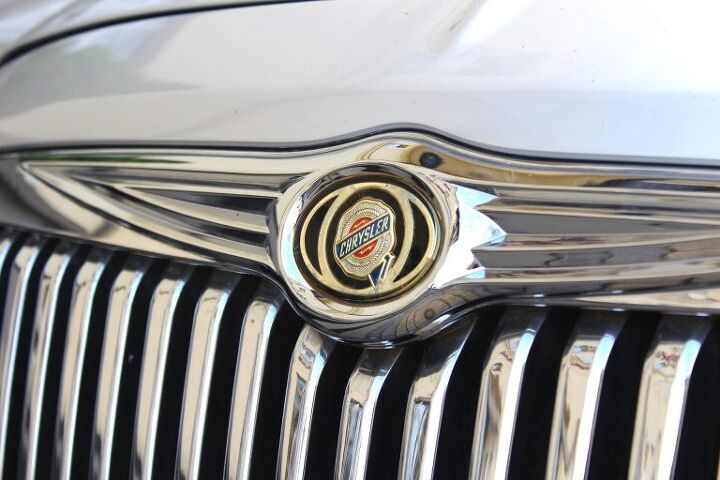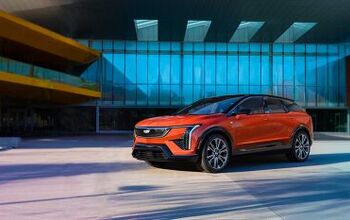'The Brand Has Seen Some Softening,' Is One of the Most Accurate Statements Chrysler Has Ever Made About Chrysler
“When I look at the new Imperial,” Chrysler Corporation chairman Lee Iacocca said in 1980, “I see an electronic marvel.”
He may have been reaching.
“We understand the speed with which we have to act,” Chrysler Group CEO Bob Nardelli said in mid-2008, months before Chrysler’s collapse showed that whatever understanding there was did not find itself successfully implemented.
More recently, however, in Fiat Chrysler Automobiles’ recap of its brands’ 2018 U.S. sales performance, the company’s own take on the Chrysler marque’s results was stunningly honest. “Overall,” FCA said in its press release, “the brand has seen some softening during the year following the continued wind-down of the Chrysler 200 and the Town & Country.”
Ya don’t say.
Chrysler’s abandonment of its namesake brand has not been a wholesale Abraham/Hagar desertion. As recently as 2016, FCA offered Chrysler meaningful sustenance in the form of the Chrysler Pacifica. Whilst the Dodge brand didn’t merit any minivan favor and was (and is) left to battle with the antiquated Grand Caravan, the Chrysler brand received an all-new minivan platform.
Indeed, the stylish Pacifica managed to increase its sales tally by a wide margin in 2017, not unexpectedly, and then by a statistically inconsequential margin in 2018.
But 2016 was the very same year that Chrysler killed off its best seller, the 200, as the brand’s poorly executed midsize sedan – by the company boss’s own admission – could only be sold in high volumes with excessive incentivization or at extraordinarily low volumes with decreased incentives. It was destined to be unprofitable in either case.
The result, in 2017, was a Chrysler brand that reported its lowest U.S. sales since the 2009 turmoil. The result, in 2018, was a Chrysler brand that reported even worse output. Only 165,964 Chrysler-branded vehicles were sold in the United States in 2018, a 12-percent year-over-year drop that FCA refers to as “some softening.”
The Pacifica produced 7 out of every 10 Chrysler sales in 2018, leaving most of the remainder for the aged 300, a full-size sedan lingering in a markedly anti-full-size sedan market.
And that’s it. That’s all Chrysler has. There’s no compact crossover to challenge the Toyota RAV4. There’s no subcompact crossover to battle Mazda CX-3s and Buick Encores. Chrysler wasn’t the brand to introduce the Telluride at NAIAS 2019 – that was Kia. Would Chrysler be the brand to produce a uniquely American Volkswagen Arteon? Apparently not.
It’s not as though Chrysler is America’s Alfa Romeo, a brand with virtually no experience as a full-line auto brand. Chrysler’s mainstream status is recent. In 2005, Chrysler owned 4 percent of the U.S. market with a six-vehicle family: Crossfire sports coupe, Sebring midsize sedan, 300 full-size sedan, three-row Pacifica crossover, Town & Country minivan, and the PT Cruiser, a loathe-it-if-you-must design icon.
From that 2005 strong point, Chrysler’s situation fell apart. Sales are 74 percent lower now than they were in 2005, having declined in 8 of the last 13 years. In fact, Chrysler volume has fallen by nearly half since 2015, and the brand’s market share is now below 1 percent.
Of course, the real story lies not in the fact that Chrysler sales are falling. Sales are bound to decline when a lineup is decimated.
No, the real story is that the “softening” shows no signs of, well, hardening. Chrysler, as Larry Vellequette wrote in May 2018, “isn’t weak because consumers abandoned it.”
“It’s weak because FCA did.”
This isn’t the story of, say, Lincoln, where a resurgent Navigator and a stunning Aviator lend credence to the notion of a strengthened position in the luxury market.
This isn’t the story of Cadillac, where a gradual (China-based) global sales ascent is fuelled by XT-badged crossovers, the likes of which are completely absent in the Chrysler lineup.
Indeed, this isn’t the story of tiny Mazda, which is diving headlong into a partnership with Toyota for U.S. production of its fourth utility vehicle.
This is the story of Chrysler, which may produce an electric van, and could become known as a “people mover” brand, in the words of the late Sergio Marchionne.
It all closely resembles the end of a story.
[Images: Fiat Chrysler Automobiles]
Timothy Cain is a contributing analyst at The Truth About Cars and Driving.ca and the founder and former editor of GoodCarBadCar.net. Follow on Twitter @timcaincars and Instagram.
More by Timothy Cain
Latest Car Reviews
Read moreLatest Product Reviews
Read moreRecent Comments
- TheEndlessEnigma Hybrids and PHEVs make sense, EV's do not.
- Ajla My understanding is that the 5 and 7-Series cater almost exclusively to the Chinese market and they sell them here just so they don't look weak against Mercedes and Audi.
- EBFlex Interesting. We are told there is insatiable demand for EVs yet here is another major manufacturer pivoting away from EV manufacturing and going to hybrid. Did these manufacturers finally realize that the government lied to them and that consumers really don’t want EVs?
- Kwik_Shift_Pro4X What's worse than a Malibu?
- MaintenanceCosts The current Malibu is poorly packaged; there's far more room inside a Camry or Accord, even though the exterior footprint is similar. It doesn't have any standout attributes to balance out the poor packaging. I won't miss it. But it is regrettable that none of our US-based carmakers will be selling an ordinary sedan in their home market.




































Comments
Join the conversation
Maybe FCA need to look at VW group for how to manage many brands SEAT and Skoda nip at the feet of VW, which encroaches upon Audi, then the luxo brands of Lamborghini, Porsche and Bentley. Maybe given the relative failure of Alfa Romeo to make inroads, they should regrille and rebadge them as Chrysler. (They did this for Lancia in the UK/Ireland - for a while you could buy a Chrysler Delta - and the opposite in continental Europe when they rebadged Chryslers as Lancia - 300 as Thema)
Only a fool would believe that the Chrysler brand should be killed. The 300 is still selling well. Better in 2018 than in many years. To think of the Chrysler name as main-stream or basic transportation is ridiculous. No one who knows anything about cars considers the Chrysler brand as being below Dodge. FCA is in a position define 'Chrysler' any way they like. The opportunity exists to create an American flagship brand.